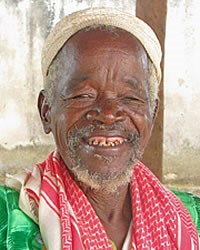Wassulu in Côte d'Ivoire

Photo Source:
Wassulu Strategy Coordinator
|
Send Joshua Project a map of this people group.
|
| People Name: | Wassulu |
| Country: | Côte d'Ivoire |
| 10/40 Window: | No |
| Population: | 20,000 |
| World Population: | 359,000 |
| Primary Language: | Maninkakan, Eastern |
| Primary Religion: | Islam |
| Christian Adherents: | 0.00 % |
| Evangelicals: | 0.00 % |
| Scripture: | New Testament |
| Ministry Resources: | Yes |
| Jesus Film: | Yes |
| Audio Recordings: | Yes |
| People Cluster: | Manding |
| Affinity Bloc: | Sub-Saharan Peoples |
| Progress Level: |
|
Introduction / History
A warm and hospitable people, the Wassulu of West Africa claim to originate from the Futa Jalon (Fulani) of Guinea. They tell various stories of their past. One oral account says that the Wassulu once lived among the Malinke, but in time were told to leave because of their pride and boastfulness about their many possessions. Though the historical accounts of the group's origin and of how they lost their original language vary, the fact that they speak a form of Bamanakan (Bambara) indicates the influence the Bamana (Bambara) people had as the Wassulu settled near them. Wassulu-Bamanakan is also closely related to other Northern Mande languages (Jula and Maninka) found in West Africa. Simply stated, the Wassulu have adopted some of the culture and language of the people they once lived among, while retaining their ethnic identity, thus forming a new people group with their own set of beliefs, traditions, and language.
What Are Their Lives Like?
As with many people groups, geopolitical borders do not define the area inhabited by the Wassulu people. The Wassulu region expands from the southwest corner of Mali, to the northwest corner of Ivory Coast and the northeast part of Guinea. Their villages are often remote and some are inaccessible by car at the peak of the rainy season. Like many West Africans, they live a simple lifestyle depending on locally grown crops to feed themselves with little dependency on food items brought into their region. Corn is an important grain in their diet, particularly in Mali. Peanuts, mangoes, and citrus fruits are found in some areas. Cotton is also grown, primarily for export.
What Are Their Beliefs?
Though historical facts are at times obscure, the spiritual needs of the Wassulu people are clear and unchanged. Islam was introduced among the Wassulu in the late 1800s. Although there is strong evidence of Muslim practices in their villages, many of the Wassulu also continue to follow traditional African religious beliefs and practices. This mixture of practices is commonly referred to as folk Islam. The number of Wassulu Christians is believed to be a very small percentage of the population. Christians of other people groups live among the Wassulu in some regions, but often there are cultural barriers that inhibit a natural sharing of the Gospel.
Prayer Points
Pray for lay pastor "F," who resides in Bamako, the capital of Mali. As a descendent of Wassulu grandparents, God has given him a passion for his ancestral people. Praise God that funding has been provided to assist him in making monthly visits to the Wassulu region of Mali in order to lead chronological Bible storying in key Wassulu villages.
Pray specifically for Chief M of Village B who has heard all of the chronological Bible stories and has a clear vision of who Jesus is in a dream. Pray that the Holy Spirit will not let Chief M rest until he boldly confesses that Jesus is indeed The Way!
Join in praying also for Chief Z in Village Y as well as the religious and cultural leaders in the Wassulu region. Some have come to hear the stories; pray that their hearts will be pierced as they hear the Truth.
Pray for the churches in the U.S. that are partnering to take on the strategy coordinator role for reaching the Wassulu for Christ.
Pray that they will seek God at every step as they work with Pastor F and the few believers to ignite the flame of passion for Christ among the Wassulu.